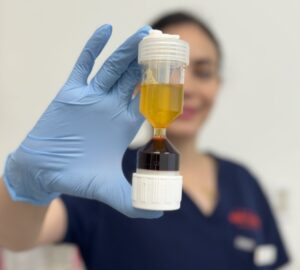Hair loss is a common problem for many individuals, and its causes can vary significantly. One factor that is often overlooked is inflammation and its impact on hair loss. Inflammation is the body’s natural response to infection, but when it becomes chronic, it can have detrimental effects on hair follicles in particular. This article aims to shed light on the connection between inflammation and hair loss, exploring hair loss causes, its impact on the hair growth cycle, signs to look out for, and hair loss cure options.
Common Causes of Hair Loss
Before delving into the relationship between inflammation and hair loss, it is important to understand the common causes of hair loss. Several factors that can contribute to hair loss, including genetics, hormonal imbalances, nutritional deficiencies, and certain medical conditions. Stress, excessive styling, and harsh chemical treatments can also play a role in hair loss. It’s important to identify the root cause and to determine the most effective treatment approach.
The Link Between Inflammation and Hair Loss
Inflammation can directly impact the hair follicles and disrupt the hair growth cycle. When the body experiences inflammation, it releases pro-inflammatory cytokines, which can damage the hair follicles and impede their ability to produce healthy hair strands. Additionally, chronic inflammation can trigger an autoimmune response, leading to conditions like alopecia areata, where the immune system mistakenly attacks the hair follicles. Understanding this link between inflammation and hair loss is crucial in developing effective treatment strategies.
Understanding the Hair Growth Cycle
Before delving deeper into the impact of chronic inflammation on hair follicles, it is important to have a basic understanding of the hair growth cycle. The hair growth cycle consists of 3 main phases: anagen (growth), catagen (transition), and telogen (resting). Inflammation can disrupt this cycle by shortening the anagen phase and prolonging the telogen phase. This results in thinner, weaker hair strands and reduced hair density. Targeting inflammation can make it possible to restore the balance of the hair growth cycle and promote healthier hair growth.
The Impact of Chronic Inflammation on Hair Follicles
Chronic inflammation can have a severe impact on hair follicles. As inflammation persists, it can lead to fibrosis, a process where excess collagen is deposited around the hair follicles, inhibiting their function. This fibrotic scarring can further impede hair growth and contribute to permanent hair loss. Moreover, chronic inflammation can disrupt the blood supply to the hair follicles, depriving them of essential nutrients and oxygen. These detrimental effects highlight the importance of addressing inflammation in hair loss treatment.
Identifying Signs of Inflammation-Related Hair Loss
Identifying the signs of inflammation-related hair loss is crucial in determining the appropriate treatment approach. Some common signs include scalp redness or irritation, itching, and tenderness. Excessive shedding, thinning hair, and noticeable bald patches indicate inflammation-related hair loss. If you notice any of these signs, it is essential to consult with a medical doctor (such as a dermatologist) for an accurate diagnosis and treatment plan.
Treating Inflammation-Related Hair Loss
Treating inflammation-related hair loss requires a multi-faceted approach that addresses both the underlying inflammation and promotes hair growth. Home remedies may help decrease inflammation and encourage a healthy scalp, while professional treatment options, such as corticosteroid injections or topical immunotherapy, may be recommended by healthcare professionals to target inflammation directly.
Hair Loss Solution for Females Experiencing Inflammation-Related Hair Loss
Inflammation-related hair loss can affect both males and females, but the treatment approaches may differ due to hormonal variations. Females experiencing inflammation-related hair loss benefit from a combination of treatments, including anti-inflammatory medications, hormonal therapy, and topical solutions. Females should seek advice from a healthcare professional who specializes in hair loss to pinpoint the cause and create a suitable treatment strategy.
Inflammation’s Role In Hair Loss
How Big of a Role Does Inflammation Play in Hair Loss?
If you’ve done any research on male pattern balding (MPB), you’ve likely heard inflammation is a major cause of hair loss in men. Indeed, inflammation is involved in many undesirable conditions, including acne, asthma, and arthritis.
While dihydrotestosterone (DHT) is indisputable as the cause of men’s hair loss, it’s not necessarily the hormone itself that causes hair loss. Rather, DHT attacks the hair follicles and causes them to become inflamed, which in turn causes the follicles to shrink and the hair shaft to weaken. This process leads to hair thinning and eventually disappearing altogether.
This being the case, a lot of men are looking for ways to reduce inflammation on their scalp hoping to halt or reverse their hair loss. Below are some of the best ways to deal with inflammation.
How to tackle inflammation
-
Diet
A poor diet is a big source of inflammation in the body. The average Western diet is full of processed foods that cause inflammation in the body. Eating a diet that’s rich in omega-3 fatty acids and antioxidants will help produce the optimum conditions in the body for hair growth. Good foods and supplements to take include cod liver oil, blueberries, walnuts, yogurt, turmeric and green apples.
-
Ketoconazole shampoo
Ketoconazole shampoos are an excellent way to treat scalp inflammation topically. Ketoconazole is often used as a way to treat dandruff because of its anti-inflammatory properties, but it’s also great for hair loss. Many people who use a ketoconazole shampoo will notice a thicker appearance to their hair and that they shed much less.
-
Finasteride
Finasteride (AKA Propecia) is a drug that inhibits DHT at a systematic level. While it doesn’t address inflammation directly, the reduced DHT in the body will mean less DHT on the scalp and, therefore, less inflammation. It is one of the few clinically proven treatments on the market to treat male pattern balding.
-
Minoxidil
Minoxidil is the generic name for a topical solution applied to the scalp used to prevent hair loss in those with male pattern hair loss or female pattern hair loss. It is also used to regrow hair in people with genetic hair loss, or androgenetic alopecia. When used daily for 3-6 months or more, it is effective at preventing hair loss and stimulating hair growth. Topical minoxidil solution is one of only two Health Canada and FDA-approved medications specifically designed for regrowing hair. The most common brand name for topical minoxidil solution is Rogaine.
FAQs
Can stress contribute to inflammation-related hair loss?
Yes, chronic stress can trigger inflammation and contribute to hair loss. Managing stress levels through relaxation techniques or therapy can help to reduce inflammation and also promote hair growth.
Are there any specific foods that can reduce inflammation and promote hair growth?
Foods rich in antioxidants, omega-3 fatty acids, and vitamins like C and E can help reduce inflammation and support hair growth. Examples include salmon, berries, spinach, and nuts.
Will inflammation-related hair loss recur after treatment?
Inflammation-related hair loss can recur if the underlying cause is not properly addressed or if there is ongoing exposure to inflammatory triggers. It is crucial to follow a comprehensive treatment plan and make necessary lifestyle changes to prevent recurrence.
Is inflammation-related hair loss permanent?
Inflammation-related hair loss can be reversible if addressed promptly and appropriately. However, if left untreated for an extended period, it can lead to permanent hair follicle damage and irreversible hair loss.
Conclusion
Understanding the role of inflammation in hair loss is important for effective treatment and prevention measures. By recognizing the signs of inflammation-related hair loss, addressing underlying causes, and adopting a multi-faceted approach, individuals can combat inflammation and promote healthy hair growth. Whether through natural remedies, dietary changes, or professional treatments, taking proactive steps can help slow or reverse hair loss and restore your confidence. Remember to seek advice from a dermatologist or healthcare professional to determine the best course of action for your specific needs. Take charge of your hair’s health and say goodbye to inflammation-related hair loss.











